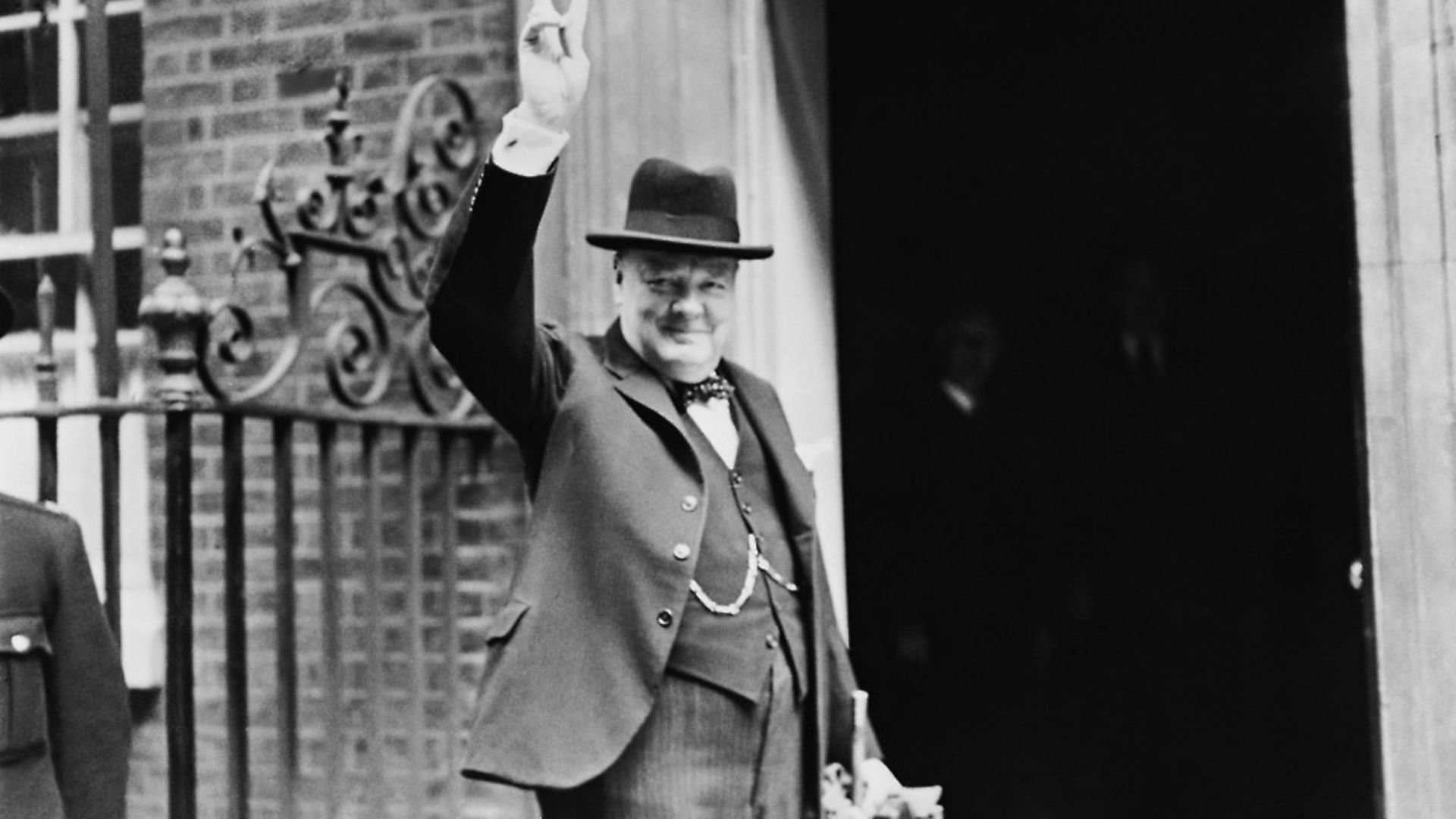
The legend of the great leader has created a damaging legacy for British politics which is harmful to both the left and right, says Steve Richards.
There is Winston Churchill and there is ‘Winston’. The first was a complex, epic and flawed human being. The second is a mythologised hero who hovers darkly over all subsequent prime ministers. The mythological version also becomes a proxy for a thousand other raging divisions in the UK, even though the human Churchill died long ago and could have no sense or influence of the current themes erupting around a newly-disturbed nation. The UK needs to move on from the myth but cannot seem to do so. In the current crisis, the deepest since the Second World War, a bewildered country clings to ‘Winston’ with a greater need than ever.
When the shadow chancellor, John McDonnell dropped his political antennae last week and described ‘Winston’ as a villain, all hell broke loose. Newsnight revised its running order to include an item on this ‘breaking news’. Twitter erupted. McDonnell was doorstepped by television cameras and journalists as he left his home the next morning. In the deafening noise, the context of McDonnell’s remarks was almost wholly lost. He was taking part in a silly end-of-interview one word answer sequence , where nuance is impossible. He was asked ‘Churchill-Hero or Villain?’ McDonnell replied ‘villain’ on the grounds that, as home secretary, Churchill sent in troops to deal with striking miners in Tonypandy in 1910.
The uproar is much more significant than McDonnell’s response to a silly question. ‘Winston’ casts a spell over British politics that is more potent even than Margaret Thatcher’s continuing influence. The myth cannot be challenged. Instead, like Thatcher, at key moments in the UK’s history Churchill is cited or echoed to justify a current policy or posture.
With the same intensity, the mythological figure also becomes part of the current political divide. Supporters of Jeremy Corbyn’s leadership leapt to McDonnell’s defence, some of them going much further in highlighting Churchill’s villainy. Corbyn’s opponents, including his internal foes, came readily to the war leader’s defence.
The human being died in 1965. ‘Winston’ is proxy for a battle about the future of the Labour Party and as part of the wider culture war in the UK in which rows over national identity are often viewed through perceptions of Churchill.
Like Thatcher, Churchill is the only other deceased prime minister who has played a part in the deranged Brexit saga. There has been absurd and inevitably subjective speculation about how each of them would have voted in the calamitous 2016 referendum.
Mostly the impact of ‘Winston’ on UK public life has been damaging in lots of different ways. The myth compels prime ministers to become delusional about the country’s ‘unique’ place in the world. After the Falklands War in 1982 Thatcher started to refer to Churchill as ‘Winston’, as if she had known him well when she had not.
Evidently she saw herself as a fellow war leader, even if Churchill had defeated a tyrant that threatened the globe while she had seized back a small island. Thatcher became more imperious after the Falklands, as if she had passed the test of leadership implicitly set by Churchill. She had been a victorious war leader.
Tony Blair deployed Churchillian language after the war in Iraq. ‘At our best when at our boldest,’ Blair declared often and usually when he was being the opposite of politically courageous. Churchill could have been the author of the phrase. The ghosts of ‘Winston’ and Thatcher were on Blair’s shoulders as he made his way towards Iraq.
Even the inarticulate Theresa May adopts the mythological version of Churchill as she makes her dangerous moves. Each time she stumbles on her contorted Brexit journey she declares outside Number 10, or writes in an article, that she is returning to Brussels to ‘battle for Britain’.
It is only since the rule of ‘Winston’ that the metaphor is applied. In May’s case she is being unintentionally comic. There is the biggest of leaps between Churchill’s battle for Britain and May’s pathetic attempts to persuade the EU to give her enough to keep Brexit hardliners happy. Yet the metaphor still works for May. In parts of the UK, or to be more precise, in parts of England, which yearn for an equivalent of ‘Britain’s finest hour’ under Churchill, voters seem to approve when May proclaims she’s battling for Britain against the rest of Europe. The Churchillian metaphor becomes a grotesque distortion.
More widely the Churchill myth distorts the entire Brexit debate. On phone-ins, Brexiteer voters suggest most days of the week that the UK prevailed in the war and can do so in the event of no-deal. Films such as Darkest Hour and Dunkirk become not only histories about Churchill’s heroism but about the overwhelming greatness of the UK too.
Inadvertently they become Brexit films, as ‘Winston’ becomes the guiding light for some Brexiteers. With ‘Winston’ as their hero they see this era as one in which the UK takes on the wretched continent once more. Unsurprisingly, Boris Johnson wrote a biography of Churchill in which virtually every paragraph invited a recognition of the similarities between author and subject. Part of Johnson believes he is Churchill, the political loner and prolific author saving his country from tyranny across the continent.
These are terrible consequences of the myth. The real Churchill was the opposite of Johnson, opposing appeasement, a policy that was popular in his party and much of the media. Johnson supported Brexit, a policy backed by most of his party membership and the most bullying newspapers.
Churchill rose to the demands of power when he became prime minister. Johnson failed to do so when he was made foreign secretary and now opts for the tame safety of the backbenches, where he mistakes banal assertions for a Brexit policy. Churchill was an unreliable narrator but he could master detail when he chose to do so.
The myth also comes to the aid of the left. While it is absurd that McDonnell cannot criticise Churchill’s erratic conduct as home secretary, there is a wider purpose being served if ‘Winston’ becomes a villain rather than a hero. With Churchill’s myth no longer the guiding light, a space is cleared for a foreign policy that marks a radical leap from the past: no more ‘special relationship’ with the US; a UK less committed to NATO and perhaps a move away from the EU too.
A Corbyn government would not want ‘Winston’ breathing down its necks. So while some vilified McDonnell for reasons far removed from the real Churchill, others rushed to vilify the former prime minister with the future in mind and not the past. They too succumb to mythology. Uprooting Churchill will do little to make a new radical foreign policy any easier to implement even if the myth of the war leader has distorted for the worse the conduct of recent prime ministers and the current one.
In the same way Hamlet the character should not be extracted from the play Hamlet, Churchill should not be placed in any contemporary context. Who knows what he would have thought of the Falklands War, Iraq, Brexit and Corbyn’s foreign policies? He was a product of his time just as Hamlet was the creation of Shakespeare, who rooted him in his version of a troubled Elsinore.
But there are deep lessons from Churchill, as he acted then and not as he might have acted now or in the recent past. He was a political teacher as a leader and aspiring leader. At any given moment he framed arguments that made sense of what he was seeking to do. He did not know for sure whether British troops would ‘fight them on the beaches’ but he understood the power of argument and persuasion. Compare him and quite a few of his peer group in the House of Commons in the late 1930s at a junction of epic historic significance to a lot of contemporary MPs.
Listen now to puny MPs arguing that their constituents want them to ‘get on’ with delivering Brexit, as if that vague demand is a decisive argument. Quite a lot of the current House of Commons lack language, persuasive power or the capacity to understand and frame an argument. They are terrified of challenging the shallow prejudices, often based on Churchillian mythologies, of those that elected them.
Still no one knows what May thinks of Brexit, but she has not turned her opaque approach into an art form. She is too obviously evasive and lacking in dexterity. Corbyn too fails to explain. Why did he become a reluctant Remainer in 2016? What was his journey to becoming an advocate, albeit a near silent one, of a Brexit with a customs union? No one knows.
In contrast, Churchill was always explaining. He argued forensically against appeasement, put the case for a UK victory in war and then argued subsequently for a united states of Europe. These are not myths. They are his words and his explanations to make sense of the era in which he ruled or sought to rule.
Forget about rowing over mythologies. At a point when parliament is as pivotal now as it was in 1940 current politicians could learn a lot about what Churchill said in the context of the times. The Brexit crisis needs Churchillian politicians, not politicians squabbling about the myth of ‘Winston’.
Steve Richards’ latest book Modern Prime Ministers – The Lessons of Leadership is published later this year










